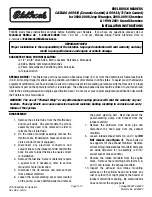
The holes in the dipstick will be full of fluid if the
actual level is at or above the hole. The fluid level
should be between the
⬙
HOT
⬙
(upper) reference holes
on the dipstick at normal operating temperature. If the
fluid level is low, add fluid through the dipstick tube
to bring it to the proper level.
Do not overfill.
Use
ONLY the recommended fluid (see
⬙
Fluids, Lubri-
cants, and Genuine Parts
⬙
for fluid specifications).
After adding any quantity of oil through the dipstick
tube, wait a minimum of two minutes for the oil to
fully drain into the transmission before rechecking the
fluid level.
NOTE:
If it is necessary to check the transmission
below
the operating temperature, the fluid level should be
between the two “COLD” (lower) holes on the dipstick
with the fluid at approximately 70°F (21°C) (room tem-
perature). If the fluid level is correctly established at
room temperature, it should be between the “HOT”
(upper) reference holes when the transmission reaches
180°F (82°C). Remember it is best to check the level at the
normal operating temperature.
CAUTION!
If the fluid temperature is below 50°F (10°C) it may
not register on the dipstick. Do not add fluid until
the temperature is elevated enough to produce an
accurate reading. Run the engine at idle, in PARK, to
warm the fluid.
7. Check for leaks. Release the parking brake.
NOTE:
To prevent dirt and water from entering the
transmission after checking or replenishing fluid, make
sure that the dipstick cap is properly reseated. It is
normal for the dipstick cap to spring back slightly from
its fully seated position, as long as its seal remains
engaged in the dipstick tube.
7
MAINTAINING YOUR VEHICLE
637
Summary of Contents for 2013 Durango
Page 1: ...Durango O W N E R S M A N U A L 2 0 1 3 ...
Page 4: ......
Page 9: ...1 INTRODUCTION 7 ...
Page 12: ......
Page 162: ...160 UNDERSTANDING THE FEATURES OF YOUR VEHICLE ...
Page 163: ...3 UNDERSTANDING THE FEATURES OF YOUR VEHICLE 161 ...
Page 164: ...162 UNDERSTANDING THE FEATURES OF YOUR VEHICLE ...
Page 308: ......
Page 314: ...INSTRUMENT CLUSTER 312 UNDERSTANDING YOUR INSTRUMENT PANEL ...
Page 439: ...Operating Tips Chart 4 UNDERSTANDING YOUR INSTRUMENT PANEL 437 ...
Page 440: ......
Page 513: ...5 STARTING AND OPERATING 511 ...
Page 677: ...INDEX 10 ...
Page 697: ......
















































